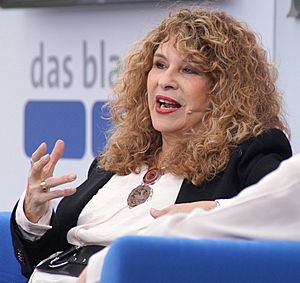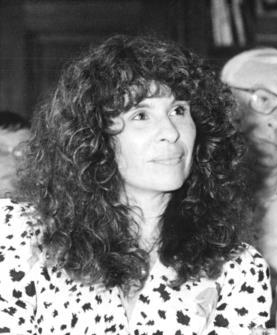Gioconda Belli facts for kids
Quick facts for kids
Gioconda Belli
|
|
|---|---|

Belli at Leipzig Book Fair 2016
|
|
| Born | December 9, 1948 Managua, Nicaragua |
| Occupation | Poet, author, novelist |
| Nationality |
|
Gioconda Belli (born December 9, 1948) is a famous writer and poet from Nicaragua. She is well-known for her amazing stories and poems that have made a big impact on Nicaraguan writing.
Contents
Early Life and Education
Gioconda Belli grew up in a wealthy family in Managua, the capital city of Nicaragua. Her father is Humberto Belli Zapata.
She went to a boarding school in Spain and finished her studies at the Royal School of Santa Isabel in Madrid. Later, she studied advertising and journalism in Philadelphia, USA. When she returned to Nicaragua, she got married and had her first daughter at the age of 19.
Her Career Journey
Gioconda Belli started her career working for Pepsi Cola. She helped connect the company with its advertising agency, Publisa. Later, Publisa hired her to work directly for them.
Joining the Sandinista Movement
Through a colleague at the advertising agency, Belli met Camilo Ortega. He introduced her to the Sandinistas, a group working to change the government in Nicaragua. In 1970, Belli joined this movement. She was sworn in by Leana Ortega, Camilo Ortega's wife.
Belli's work for the movement became very important. Because of this, she had to leave Nicaragua and live in exile in Mexico in 1975. She returned in 1979, just before the Sandinistas achieved their goals.
Role in Government and Later Life
After the Sandinista victory, Belli became an international press contact for the FSLN in 1982. She then became the director of State Communications in 1984. During this time, she met Charles Castaldi, an American journalist, and they married in 1987.
After 1990, she spent her time living between Managua and Los Angeles. She later left the FSLN and became a strong voice against the government led by Daniel Ortega. Today, she lives in exile in Madrid, Spain.
Gioconda Belli's Writing
Gioconda Belli started publishing her poems in 1970. Her first poems appeared in the literary section of a Nicaraguan newspaper called La Prensa. In 1972, she won the Premio de Poesía Mariano Fiallos Gil award for her poetry.
Famous Novels and Autobiography
In 1988, Belli's book La Mujer Habitada (The Inhabited Woman) became very popular. This novel was partly based on her own life. It talked about women's issues in the context of the Nicaraguan revolution. The book has been translated into many languages and was studied at several universities in the United States.
The novel tells two stories at the same time. One is about the native people fighting against the Spanish. The other is about a modern fight for freedom in Central America. Both stories share ideas about women's freedom, strong feelings, and a desire for liberation.
In 2000, she published her autobiography, El país bajo mi piel, which was called The Country Under My Skin in the United States. This book focused on her involvement in the revolutionary movement. It was even a finalist for the Los Angeles Times Book Prize in 2003. Gioconda Belli continues to write and believes that poetry is her most important work.
Later Works and Awards
Belli received the Premio Casa de las Américas in 1978. In 2008, she won the Premio Biblioteca Breve for her book El infinito en la palma de la mano (Infinity in the Palm of The Hand). This book is a story that uses symbols to talk about Adam and Eve in paradise.
Her books have been published in many different languages around the world.
Her 2010 book was originally titled "Crónicas de la Izquierda Erótica." However, the title had to be changed to "El País de las Mujeres" because it was too similar to a 1973 book by Ana María Rodas. "El País de las Mujeres" tells the story of a world where women are in charge. In the novel, a group of women take power through a political party.
Her novel El intenso calor de la luna was released in August 2014 in Latin America and in September 2014 in Spain.
Political Involvement
Gioconda Belli was against the government of Anastasio Somoza Debayle. From 1970, she joined the Sandinista National Liberation Front (FSLN). This group was working secretly to overthrow the Somoza government.
She worked as a secret messenger, carried weapons, and traveled around Europe and Latin America. She gathered resources and shared information about the Sandinista struggle. She became a member of the FSLN's Political-Diplomatic Commission.
In 2018, Belli spoke out against the government of Daniel Ortega, which came to power after the 2016 elections. She became an active member of a movement that wanted to renew the Sandinista ideas.
In February 2023, the Ortega government took away Belli's Nicaraguan citizenship. On February 23, 2023, Belli accepted Chilean citizenship. The Chilean Government offered citizenship and safety to all Nicaraguans who were banished by Ortega.
Awards and Recognitions
Gioconda Belli has received many awards for her writing and contributions:
- "City of Melilla" International Poetry Award (XXVIII)
- "Mariano Fiallos Gil de Poesía" award, Nicaragua 1972
- "Casa de las Américas" award, Cuba, Poetry 1978
- Award from the "Fundación de Libreros, Bibliotecarios" and "Editores Alemanes de la Fundación Friederich Ebhert" in 1989 for La Mujer Habitada, recognized as the "best political novel of the year"
- "Anna Seghers de la Academia de Artes de Alemania" award, 1989
- "Luchs del Semanario Die Zeit" award for her book El Taller de las Mariposas, 1992
- Medal of recognition from the National Theater of Nicaragua for 25 years of cultural work
- "Internacional de Poesía Generación del 27" award, 2002
- "Pluma de Plata" award, Bilbao, 2005
- "Biblioteca Breve Award", 2008
- "Sor Juana Inés de la Cruz Award" for "best novel", International Book Fair in Guadalajara, 2008
- "Oxfam Novib/PEN Award" 2019, at the Winternachten festival in the Hague
- Honourary Doctorate from the University of Edinburgh, 2024
See also
 In Spanish: Gioconda Belli para niños
In Spanish: Gioconda Belli para niños


